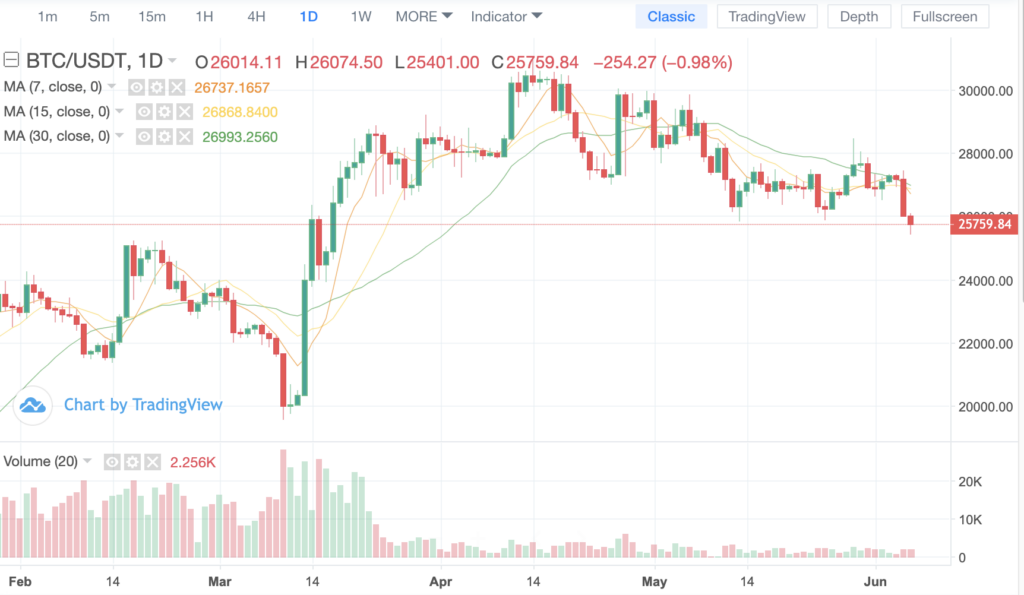Bitcoin Plunges After SEC Slams Crypto King Binance with Shock Lawsuit

The cryptocurrency market was jolted on Monday after the U.S. Securities and Exchange Commission announced an enforcement action against Binance, the world’s largest digital asset exchange, alleging that the company violated securities laws. The surprise news sent shockwaves through the crypto sector, with Bitcoin prices tumbling below $26,000 for the first time in months.
The SEC’s complaint accuses Binance and its founder Changpeng Zhao of raising billions of dollars from American investors without following proper procedures to register securities offerings and of “repeat violations” of accountability standards. The 13 charges in the SEC’s lawsuit indicate Binance’s “calculated” attempts to evade regulatory oversight while becoming a dominant force in crypto.
The damning allegations sent Binance’s native BNB token plunging nearly 10% and weighed heavily on other major cryptocurrencies. Bitcoin slumped over 5% to $25,600, relinquishing key support levels that signal further selling pressure ahead. The overall crypto market cap dropped around $50 billion as news of the SEC crackdown spread.
Regulators Worldwide Turn up Heat on Binance
Regulators worldwide have been scrutinizing Binance and expressed concerns over possible money laundering and lax controls. Earlier this year, the Commodities Futures Trading Commission filed a separate complaint accusing Binance of illegally operating a derivatives exchange. Germany’s BaFin regulator and the UK’s FCA have also issued warnings against Binance for unlicensed activity.
The latest SEC charges significantly ramp up the regulatory pressure on Binance and present an existential threat to its operations. The world’s biggest crypto trading platform could face hefty fines and even be forced out of business if found guilty of violating U.S. securities laws at the scale alleged in the complaint.
The action shows regulators are following through on promises to rein in the loosely regulated crypto sector. The charges against the dominant Binance exchange may have consequences for the broader industry and how traders access digital assets. Some analysts argue stricter rules are necessary to protect investors and foster mainstream adoption of cryptocurrencies.
Others worry the harsh crackdown on Binance could drive activity underground and stifle innovation in the sector. The opaque nature of crypto markets means determining which tokens qualify as securities can be complex. Exchanges argue that newly issued tokens start as utilities but often morph into securities over time, creating confusion over compliance responsibilities.
The SEC’s stance suggests most cryptocurrencies currently meet the definition of security and should register with the agency. The complaint against Binance alleges the company allowed Americans to trade dozens of unregistered crypto securities and evaded regulatory requirements through a complex network of subsidiary companies.
You may like How to Profit from Bitcoin Price Fluctuations in 2023
The Future of Binance Remains Uncertain
Despite the serious accusations, Binance CEO Changpeng Zhao remains defiant, dismissing the charges as “FUD” (fear, uncertainty, and doubt) in social media posts. However, the exchange now faces difficult decisions over whether to settle with regulators or contest the charges in court. Mounting legal fees and protracted court battles could significantly damage Binance’s leading position even if the company prevails.
Binance has grown into a crypto conglomerate encompassing numerous business lines, with ambitions to become a leader in areas like NFTs, metaverses, and Web3. The SEC’s crackdown jeopardizes those growth plans and casts uncertainty over the future of the Binance empire. The exchange may have to restructure operations to comply with securities laws or risk losing access to the lucrative U.S. market altogether. Either path will likely transform the company Changpeng Zhao built into a global crypto powerhouse.
The broader implications of the SEC’s lawsuit against Binance ripple beyond the future of the exchange alone. The action signals regulators globally intend to subject cryptocurrencies and crypto companies to the same rules governing traditional financial markets. Platforms and tokens not meeting their standards risk penalties, sanctions, and even criminal prosecution.
Comply or Die
For the crypto industry, the writing is on the wall: comply or die. Exchanges and crypto projects must now register their offerings, put in place proper compliance procedures, and open their books to regulators. Those unwilling or unable to do so will be shut out of leading markets with little chance of mainstream success. Adapt or perish—that is the choice crypto companies now face.
Some analysts argue regulation breeds legitimacy and trust in cryptocurrencies, which benefits the long-term health of the industry. Clear rules allow institutional investors, who control trillions in the capital, to confidently participate in crypto markets. Standardized, regulated marketplaces could significantly boost activity and spur the next wave of adoption.
However, others worry overzealous regulation will stifle innovation, favoring incumbents over startups. Restrictive rules may prove anathema to the open, decentralized values that originally propelled cryptocurrencies into the mainstream. There are also concerns U.S. regulators are outpacing international authorities, creating opportunities for regulatory arbitrage.
For retail crypto investors, the Binance charges highlight the importance of using regulated exchanges and researching the level of oversight on any platform before trading or storing funds. The anonymous, decentralized nature of crypto markets means funds on unregulated exchanges receive few protections and could disappear without recourse.
Conclusion
The coming months will prove crucial in determining the future course of cryptocurrency regulation and how the leading platforms navigate an increasingly harsh regulatory landscape. The SEC’s action against Binance signals the beginnings of a broader campaign to rein in the industry after a period of accommodation.
Crypto exchanges and projects must now step up compliance efforts and cooperate with regulators to shape balanced policymaking. Those unwilling or unable to comply risk following Binance’s path to insolvency or irrelevance. The crypto community anxiously awaits the next moves in this high-stakes game between regulators and the industry’s largest players. One thing is clear: the era of unchecked speculation and cowboy capitalism in crypto is over. A new age of regulation has begun.



